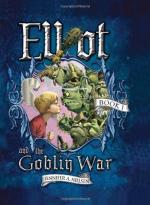“I’ll gang the nicht, mither, an’ see if I can get a job. I micht get started the morn,” he said breaking in upon her thought.
“A’ richt, Robin,” she replied with a sigh of resignation. “I suppose it’ll hae to be done. It’ll be yer first start in life, an’ I hope ye’ll aye be found doin’ what’s richt; for guid never comes o’ ill thinkin’ or ill doin.”
“If I get a job, mither, maybe I’ll get one-an’-tippence a day like Dick Tamson. If I do it’ll be a big help to you, mither. My! I’ll soon mak’ a poun’ at that rate,” and he laughed enthusiastically at the thought of it. A pound seemed to represent riches to his boyish mind. What might his mother not do with a pound? Ever so many things could be bought. And that was merely a start. His wages would soon increase with experience, and when he went down the pit, which would be soon, he’d earn more, and his mother would maybe be able to buy new clothes for all the family.
He wondered what it would be like to have a new suit of clothes—real new ones out of a shop. Hitherto he had only enjoyed “make downs,” as they were called—new ones made out of some one’s cast-off clothing. But a real new suit, such as he had seen the schoolmaster’s boy sometimes wearing! That would be a great experience! And so, lost in contemplation of the things big wages might do, the day wore on, and he was happy in his dreams.
That same night Robert went to call on the “gaffer,” Black Jock, and as he neared the door he met Mysie Maitland.
“Where are ye goin’, Rab?” she enquired shyly.
“To look for a job,” he replied proudly, feeling that now he was left school, and about to start work, he could be patronizing to a girl. “Where are you gaun?” he asked, as Mysie joined him in the direction of Walker’s house.
“I’m gaun to look for a job, too,” she replied. “I’m no’ gaun back to the school, an’ my mither thinks I’ll be as weel on the pit-head as at service. An’ forby, I’ll be able to help my mither at nichts when I come hame, an’ I couldna’ do that if I gaed to service,” she finished by way of explanation. As Mysie was the oldest of a family of six, her parents would be glad to have even her small earnings, and so she, too, was looking for a job.
When Walker came to the door, Robert took the matter in hand, and became spokesman for both himself and Mysie.
“We’ve left the school the day, Mr. Walker, an’ Mysie an’ me want to ken if ye can gie us a job on the pitheid?” and Walker noted with amusement the manly swagger in the boy’s voice and bearing.
“We dinna’ usually start lasses as wee as Mysie,” replied Walker, eyeing the children with an amused smile, “but we need twa or three laddies to the tables to help the women to pick stones.”
Mysie’s face showed her keen disappointment. She knew that it was not customary for girls to be employed as young as she was; and Robert noted her disappointed look as well.




